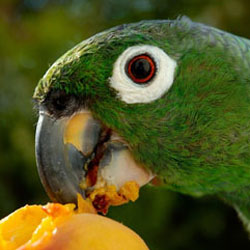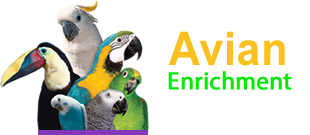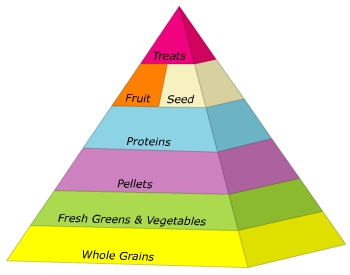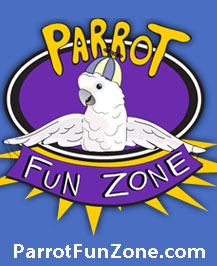Avian Diet & Nutrition: A Walk on the Wild Side

When it comes to caring for our pet birds, nothing seems to be more controversial than the topic of diet and nutrition. However, nothing is as important as making sure your bird has a healthy and complete diet. It has been estimated that up to 75% of bird illnesses are avoidable by providing a nutritional, well balanced diet.
Many opinions flourish on what to feed and in what proportions. Before we delve into the issues, let's take a look at what a typical diet may consist of for our pet's wild counterparts.
In nature, parrots spend the majority of their day foraging for food and, in doing so, expend vast amounts of energy locating and flying to the best feeding sources, climbing around trees to reach the choicest tidbits and using their beaks to open pods and nut shells. It is typical for birds to search for food in the morning and again in the late afternoon. Feeding your bird fresh foods twice a day and also leaving dried foods available throughout the day would most closely mimic and support the natural feeding cycle. complete diet. It has been estimated that up to 75% of bird illnesses are avoidable by providing a nutritional, well balanced diet.
Many opinions flourish on what to feed and in what proportions. Before we delve into the issues, let's take a look at what a typical diet may consist of for our pet's wild counterparts.
Wild parrots are opportunistic feeders and consume a multitude of items based on seasonal availability. Parrots eat raw foods such as fruits and vegetable matter, nuts, grains, seeds, sprouts, berries, flowers, pollen, insects and larvae. Many species also supplement their diets by eating clay and salt licks.
For domestic parrots, many of the food challenges and choices have been taken away from them. Each day they are presented with a bowl of food with no need to expend and therefore consume lots of calories. In a domestic environment, it is entirely the responsibility of the parrot's human companion to provide a diet that meets the daily nutritional requirements for their bird.
Although commercial diets have significantly improved, no one commercial diet comes close to simulating how they eat in nature and none of the commercial diets provide for 100% of the nutritional needs of our birds. To date, there just hasn't been enough research. Given the complexity of the task at hand, no immediate single solution breakthroughs are expected.
Since commercial diets can't reliably replicate a bird's natural diet, it appears that offering a broad range of nutrition and a wide variety of healthy food choices is the key to maintaining a healthy bird.
Giving your bird a varied selection of foods will not only keep them healthy and beautiful but, it will also make their lives much more interesting. Imagine how dull our existence would be if we had to eat the same meal over and over again for the rest of our days! Your birds will relish the opportunity to make choices and try new foods and they will delight in exploring different tastes and textures. Additionally, presenting the food in interesting ways to trigger natural foraging behaviors will also stimulate your bird both physically and mentally.
The specific nutritional requirements for each species will differ but, in general, all parrots require a varied, well rounded diet that includes a daily combination of fresh greens, vegetables, grains, legumes, fruit, and pellets. This can be supplemented with a sprinkling of seeds and occasional treats but, in general, these should be just a small portion of what parrots eat each day (<10%).
Other factors that can impact your bird's dietary needs include:
- breeding status
- health status
- level of exercise
- age
- molting
The following diagram illustrates the relative proportions of grains, vegetables, fruits, pellets, seeds and treats that should be the basis of a bird's diet. Bird owners are strongly encouraged to research in more detail the specific needs for each of the parrot species in their flock to ensure the balance is fine tuned and other Species Specific Dietary Needs are addressed (i.e., low fat for Amazons, higher fat content for Macaws, increased vitamin A for Eclectus, low iron for softbills, lory diets).
Click on the diagram above to learn more about each food group category
For specific information on the benefits and sources of specific nutrients please refer to our article: Nutrients: Sources and Benefits.








Comments powered by CComment